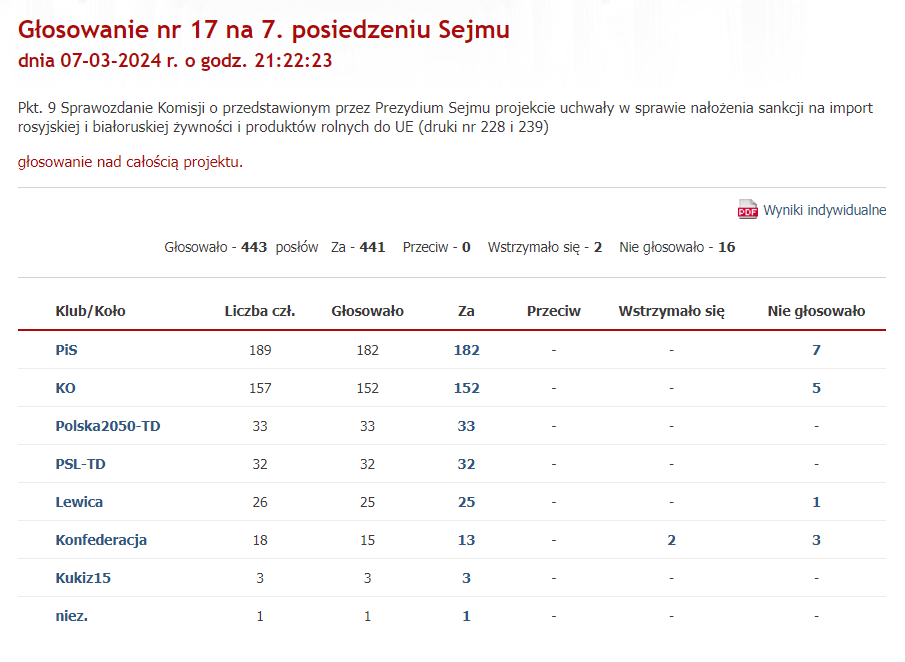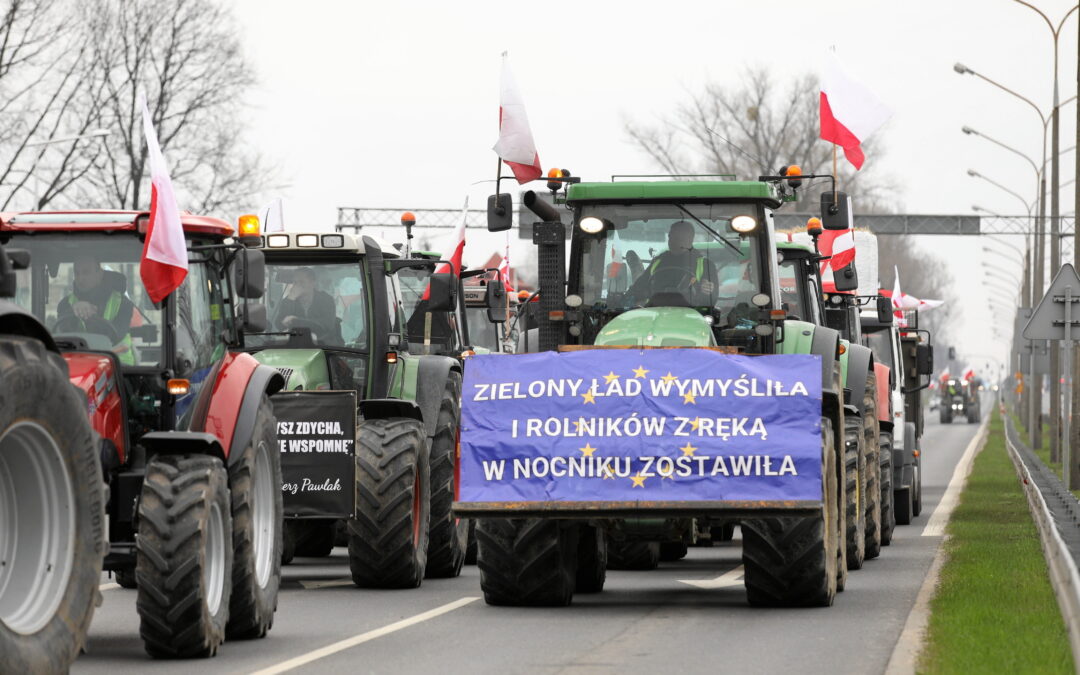Poland’s parliament has, in a near-unanimous vote, passed a resolution calling on the EU to impose sanctions on Russian and Belarusian agricultural imports, to protect domestic markets from “excessive” imports of Ukrainian produce, and to withdraw “unreasonable and costly” climate policies.
The measure comes amid protests in Poland by farmers against Ukrainian imports and EU policies. In response, the government has pledged to seek EU restrictions on Ukrainian produce, an embargo on Russian and Belarusian agricultural imports, and the suspension of some elements of the Green Deal.
Farmers have started fires outside Prime Minister @donaldtusk's office amid outbreaks of disorder during their latest protest in Warsaw.
Some demonstrators clashed with police while others have thrown fireworks at officers https://t.co/G7DoEueetC
— Notes from Poland 🇵🇱 (@notesfrompoland) March 6, 2024
The resolution notes that Russia and Belarus continue to generate large profits from agricultural exports to the EU. Eurostat data, for example, show that EU member states imported 1.54 million tonnes of grain from Russia in 2023, up from 970,000 tonnes the previous year.
“It is our moral obligation to stop trade that may directly or indirectly contribute to strengthening the ability of Russia and its supporter Belarus to continue the war with Ukraine, especially since Russian imports may include grain stolen from the occupied territories of Ukraine,” reads the resolution.
The document also notes that “Russia continues its strategy of weaponising food, causing disruptions to the supply of Ukrainian agricultural products around the world…The food and agricultural trade cannot continue to support the brutal Russian regime and its enablers in Minsk”.
The amount of grain imported by Poland from Russia last year doubled while the quantity from Ukraine fell by half.
However, Russian grain still constituted a small fraction – around 1.3% – of the amount imported from Ukraine https://t.co/uO6ppNt0Bm
— Notes from Poland 🇵🇱 (@notesfrompoland) March 4, 2024
Meanwhile, the resolution calls on the EU “to introduce changes in trade measures to protect sensitive sectors of the EU agricultural market from excessive imports from Ukraine” and to “suspend and correct the Green Deal’s excessive, unreasonable and costly requirements for agriculture”.
In a vote on Thursday evening, 441 of the 443 MPs present voted in favour of the resolution, representing a rare show of bipartisanship in Poland’s divided political scene. Two MPs from the far-right Confederation (Konfederacja) party – Grzegorz Braun and Włodzimierz Skalik – abstained from voting.
The resolution has no binding force and is therefore largely symbolic. But Marta Wcisło, an MP from Civic Coalition (KO), the main group in Poland’s ruling coalition, told the Polish Press Agency (PAP) that it would “strengthen Poland’s voice in negotiations with the EU”.

How MPs from each parliamentary group voted on the resolution. Za = for, Przeciwko = against, Wstrzymało się = abstained, Nie głosowało = did not vote
Poland itself last year doubled the amount of grain that it imported from Russia to 12,700 tonnes, which was the seventh highest figure among EU member states. However, it was still a small fraction of the over 1 million tonnes of Ukrainian grain that came to Poland.
Speaking yesterday, development minister Krzysztof Hetman noted that Russian products make up only 1% of Poland’s food imports and are worth around $380 million.
Deputy agriculture minister Stefan Krajewski also told broadcaster RMF that most Russian grain that arrives in Poland does not come directly, but via other EU member states.
Czy do Polska trafia zboże z #Rosja? Wiceminister rolnictwa: Tak, pośrednio. To może być zboże kradzione z #Ukraina
Kliknij w zdjęcie, by przeczytać więcej🔽https://t.co/8Q6ue1SBQc
— Rzeczpospolita (@rzeczpospolita) March 8, 2024

Notes from Poland is run by a small editorial team and published by an independent, non-profit foundation that is funded through donations from our readers. We cannot do what we do without your support.
Main image credit: Adam Stepien / Agencja Wyborcza.pl

Daniel Tilles is editor-in-chief of Notes from Poland. He has written on Polish affairs for a wide range of publications, including Foreign Policy, POLITICO Europe, EUobserver and Dziennik Gazeta Prawna.



















